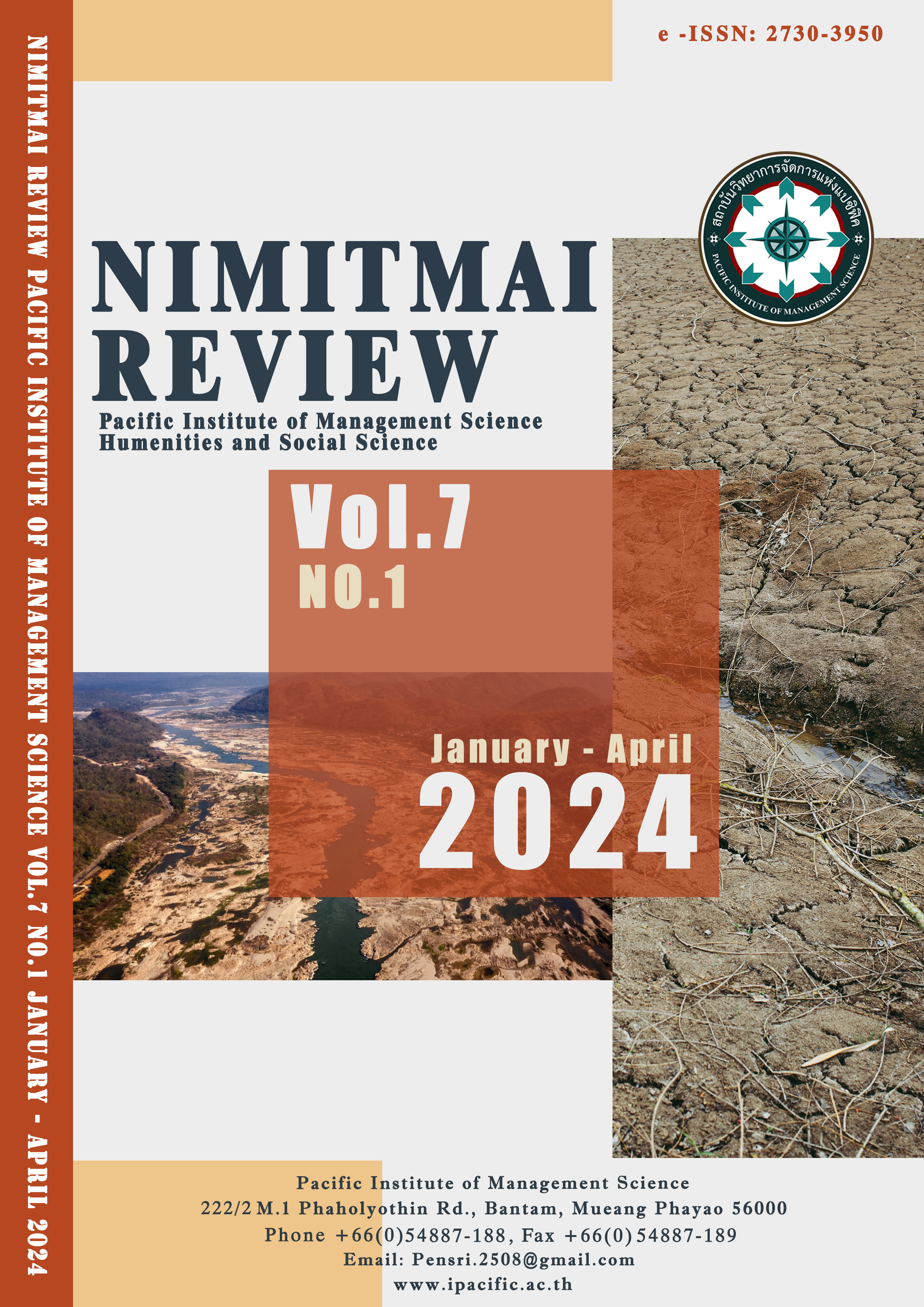The Impact of Creative Leadership, Organizational Resilience, and Cultural Change toward Developing Tourism in Rural Communitas in Anhui, Chaina
คำสำคัญ:
Creative Leadership, Organizational Resilience, Cultural Change, Developing Tourismบทคัดย่อ
This research article the objectives of this study are as follows: 1) To explore the perspectives of creative leadership, organizational resiliency, and cultural change in growing rural tourism. 2) Examine the influence of innovative leadership, organizational resilience, and cultural change on the development of rural tourism and 3) Examine how organization resilience positively mediates the relationships between creative leadership, cultural change, and tourism development in rural communities in Anhui, China. This research design uses qualitative and quantitative methods to complete objectives and test hypotheses. Questionnaires were distributed to group travelers' leaders and members to select respondents based on expertise, availability, convenience, and interest. Construct validity was examined using confirmatory component analysis and tests of convergent and discriminant validity. Path analysis was conducted to determine whether the hypothesis and organizational resilience mediate the route. In Anhui, China, where rural tourism is growing, research was done on creative leadership, organizational resilience, and cultural change. Confirmatory factor analysis is used to test if a factor and its observed variable match the researcher's theoretical relationship. According to the hypothesis, the effect of creative leadership on tourism development in rural villages in Anhui, China, is statistically significant. The impact of organizational resilience on tourism development in rural villages in Anhui, China, is statistically significant. The impact of creative leadership on organizational resilience in developing tourism in rural villages in Anhui, China, is statistically significant. Qualitative research showed that cultural tourism development requires recognizing capacity, establishing communication and relationships, empowering local communities, ensuring staff continuity, and sharing authority with the community. Rural communities are important as they have an effect on economic, social, cultural, and environmental development. Future research should adopt a multifaceted strategy to better comprehend the relationships between leadership, organizational resilience, and cultural change in the tourism industry.
เอกสารอ้างอิง
Arnold G.(2019). Theories of Culture. London: Routledge.
Anhui Provincial Bureau of Statistics (2018). Anhui Statistical Yearbook. Beijing: China Statistics Press; 2018.
Dennis , O.(2006). "Culture Change: Processes of Change". Culture Change. Palomar College. Archived from the original on October 27, 2016. Retrieved October 29, 2016.
José Mara López-Sanz, et al(2021). Frontiers in Psychology. 23 July 2020.
Liu, Y. et al. (2021). Analysis of the Influencing Factors of Organizational Resilience in the ISM Framework: An Exploratory Study Based on Multiple Cases. Sustainability. Published: 6 December 2021.https://doi.org/10.3390/su132313492.
Moran R.T. et al. (2014). Managing Cultural Differences, 9th Edition, London
Imprint Routledge DOIhttps://doi.org/10.4324/9781315871417
Pialat G.(2020). Using Creative Leadership Skills to Lead Teams, Effectively Stratix Exl Experiential Learning. on Jan 7, 2020
Raud, R.(2016), Meaning in Action: Outline of an Integral Theory of Culture.
Cambridge: Polity. Management. 11 (4): 273–283. doi:10.1111/1467-8551.00173.
Rajiv. B. (2015). "The Paradoxes of Creative Leadership." Innovation Management, 7 Aug. 2015, http://www.innovationmanagement.se/2015/07/08/cl-the-paradoxes-of-creative-leadership/.Accessed 14 August 2017. Archived 19 August 2017 at the Wayback Machine.
Business Strategy and the Environment, 27(8),1197–1208.
Rama A.& Yusuf, B, (2019). Construction of Islamic Human Development Index
Journal of King Abdulaziz University: Islamic Economics, 32, (1).43-64
Sohmen, Victor S. (2015). "Reflections on Creative Leadership". International Journal of Global Business. 8 (1): 1–14.
Steiner A.& Teasdale, S. (2019). Unlocking the potential of rural social enterprise, Journal of Rural Studies, 70, August 2019, 144-154
Tisch, D., & Galbreath, J., (2018). “Building Organizational Resilience Through Sensemaking: The Case of Climate Change and Extreme Weather Events,” Business Strategy and the Environment, Wiley Blackwell, 27(8), 1197-1208
Tudor R.&, Susan. M. (2000). "Creative Leadership Processes in Project Team Development: An Alternative to Tuckman's Stage Model". Journal of Management 11(4):273 - 283
DOI:10.1111/1467-8551.00173
Van Der Vegt et al., (2015). Managing Risk and Resilience, Academy of Management Journal 58(4):971-980 DOI:10.5465/amj.2015.4004
UNWTO. (2017). UNWTO Tourism Highlights 2017 Edition.
World Travel and Tourism Council. (2020). Global Performance Travel & Tourism
Economic Impact 2020 (2019 Figures). https://webunwto.s3.eu-west-1.amazonaws.com/s3fs-public/202006/WTTC_Overview%20%26%20 Recovery%20Initiatives_63rdCAF_UNWTO.pdf.
XIAOa L. & CAO, H. 2017). The Theoretical Model and Research Implications of Organizational Resilience, ITM Web of Conference No. 12, Paper No. 04021.
Yunis, M.S.et al.(2019). Enablers and Constraints of Female Entrepreneurship in Khyber Pukhtunkhawa, Pakistan: Institutional and Feminist Perspectives. Sustainability, 11,(1) 27.
ดาวน์โหลด
เผยแพร่แล้ว
เวอร์ชัน
- 2024-04-24 (2)
- 2024-04-23 (1)
รูปแบบการอ้างอิง
ฉบับ
ประเภทบทความ
สัญญาอนุญาต
ลิขสิทธิ์ (c) 2024 Nimitmai Review Journal

อนุญาตภายใต้เงื่อนไข Creative Commons Attribution-NonCommercial-NoDerivatives 4.0 International License.



